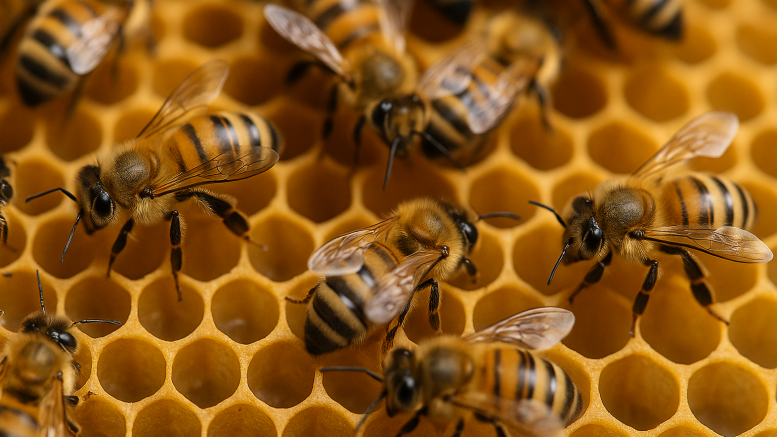Uruguayan Beekeeping Society Proposes Tax on Glyphosate
Use of living organisms to protect crops is increasing in Brazil. The global biocontrol market is expected to reach US$ 25.7 billion by 2030. Brazil leads the expansion, as treated areas increased from 35 million to 58 million hectares in five years. Bionematicides account for 47% of treated areas, surpassing chemical nematicides in soybeans, corn and cotton. Key agents include Trichoderma spp. and Bacillus spp., covering about 42% of the area under protection. (Embrapa)
In compliance with court decisions, Anvisa approves toxicological assessments of technical haloxyfop-P-methyl and tebuconazole + picoxystrobin, from Agrobeats. (Official Gazette of Brazil, Res. No. 3996 and 3997 from 10/09/2025, Anvisa)
State of Minas Gerais opened registration until November 28th for the third stage of the program to donate 10,000 tonnes of silicon fertilizer to small-sized farmers. Since 2024, 18,400 tonnes have been distributed in 149 municipalities. (Seapa; Emater-MG; Harsco Environmental)
Petrobras resumes fertilizer production in the State of Bahia. President Lula attended the event in Maragogipe, Bahia, announcing US$ 480 million in investments, including the reopening of the State of Bahia Nitrogen Fertilizer Plant – Fafen by late 2025. The plant will resume producing ammonia, urea and ARLA-32, which are key inputs for agribusiness. (Petrobras)
Coopercitrus recorded a 37.5% growth in bioinputs in 2025, which are still only 3% of the total volume of inputs. Use of these products began among large farmers five years ago and has recently grown among small and medium-sized farmers, but challenges such as the multiplicity of technologies and the need for technical support in the farms still limit adoption. (Coopercitrus)
National Institute of Metrology, Quality and Technology and Embrapa’s Agrobiology Unit have signed a partnership to ensure the quality and traceability of bioinputs, especially microbial inoculants, in Brazil, which total 140 million doses per year, with a 13% increase in the 2024/25 season and 156 million hectares treated, mainly soybeans (62%). (Inmetro; Embrapa)
According to Flavio Hirata, partner at AllierBrasil – a regulatory consulting firm , as of October 14th, 2025, Anvisa approved, in compliance with court decisions, 86 pesticide toxicological evaluations, 77 of which are formulated products, while Ibama approved 48 environmental evaluations of formulated products in compliance with court decisions. (AllierBrasil)
Brazilian imports of fertilizers and pesticides increased in 2025. 34 million tonnes of fertilizers were brought into the country from Jan-Sep, an increase of 6% when compared to 2024. Spending reached US$ 11.5 billion, an increase of 18%. Pesticide imports totaled 751,000 tonnes, a 42% increase, generating US$ 4.1 billion. Although the volume is a record, spending was lower than in 2022, when prices were higher. (Secex; Serasa Experian)
Industry and farmers advocate for regulation of Bioinputs Law No. 15070/2024, highlighting the need for a decree that guarantees legal certainty, regulatory flow, registration and predictability. (Sindiveg; CropLife)
Global bioinputs market slowed down from 2022 to 2024, with M&A decreasing 41%, from 32 to 17 transactions in the period, after peaking at 82 transactions in 2020. (DunhamTrimmer)
AI-based system optimizes fall armyworm (Spodoptera frugiperda) detection in Brazilian farms. Researchers from Embrapa developed a technology combining image sensors and machine learning to identify S. frugiperda on corn leaves and ears. Using regular cameras attached to farm equipment, the system recognizes five developmental stages of the pest, improving monitoring accuracy and speed. (Embrapa Instrumentation)
Mineral nanoparticles strengthen seed germination. Research performed by the Agricultural Research Company of the State of Minas Gerais and the Federal University of Viçosa showed that treating seeds with zinc, selenium and boron nanoparticles increased germination performance under water stress by up to five times and boosted root length tenfold. The patented technology aims to enhance nutrient efficiency and plant resilience to climate stress. (Epamig; UFV)
Ibama and Anvisa officials will attend international events. Ibama authorized the participation of analysts Déborah Mendes Máximo Cardozo, Eduardo Bernardes Melo da Silva and the Coordinator of Environmental Re-evaluation of Pesticides, Flávia Elizabeth de Castro Viana Silva, in SETAC North America 2025, in Portland, USA, from November 14th to 22nd; Anvisa authorized Cássia de Fátima Rangel Fernandes and Juliano dos Santos Malty to represent the agency at AgroChemEx 2025, in Shanghai, China, from October 9th to 18th. (Official Gazette; Order No. 177/2025 and Ordinances from October 8th, 2025; Anvisa and Ibama)
Early weed management is considered essential for the success of Brazil’s 2025/26 soybean crop. Experts say pre-planting control ensures uniformity and lowers corrective application costs, particularly amid rising resistant species. The practice is viewed as strategic for improving crop productivity and sustainability. (Safras & Mercado)
Partial adoption of no-till farming has increased herbicide use in soybean farms. From 1993 to 2023, soybean acreage grew 317%, while estimated use of synthetic herbicides rose 2,019%, reaching 195,000 tonnes. Many farmers use no-till practices without crop rotation, live soil cover, or green manure, leading to more weeds and higher production costs. (Instituto Escolhas)
Resistance of wild poinsettia (Euphorbia heterophylla) to herbicides is increasing, affecting about 30% of soybean farms, especially in the South of Brazil and in the State of Mato Grosso. According to the Herbicide Resistance Action Committee, the repeated use of herbicides with the same mode of action has led to resistant biotypes, including multiple resistance (ALS + PROTOX) and glyphosate resistance. Experts recommend integrated weed management and rotation of action modes to maintain product effectiveness. (HRAC-BR)
Livestock farmer Claudecy Oliveira Lemes was sentenced by Judge Emerson Luis Pereira Cajango, from the Environmental Court of Cuiabá, State of Mato Grosso, to two years and four months in prison, converted into community service, and was ordered to pay approximately US$ 180,000 in collective moral damages and US$ 18,000 to an environmental organization. From 2013 – 2018, he illegally cleared 3,847 hectares of native vegetation on Fazenda Comando Diesel, in Barão de Melgaço, within the Pantanal Biome. The defense filed a motion for clarification and stated it will appeal to the State of Mato Grosso’s Court of Justice. (MPMT)
State of Mato Grosso do Sul has become one of the main routes for illegal pesticides in Brazil, accounting for about 35-40% of seizures. Around 25% of pesticides used in the country are illegal, generating an estimated US$ 3.5 billion annually. Paraguay is considered the main hub for the formulation and entry of these products into Brazil. (Polícia Federal; IDESF)
São Paulo State University will present at Conexão Abisolo 2025, in Campinas, in the State of São Paulo, the results of 29 years of research on the use of sewage sludge as organic fertilizer in crops such as corn. The study, conducted since 1997, shows low levels of heavy metals and no contamination, proving the safety and efficiency of the input. Only 3% of treated sewage in Brazil is used in agriculture, but the material, rich in nutrients and organic matter, improves soil fertility and carbon sequestration and reduces the use of mineral inputs and urban waste. (Abisolo; Unesp)
Research projects revenues of US$ 30.58 billion in 2024 for input distributors, responsible for almost 40% of inputs in the field. (Andav; Cepea/Esalq)
2025/26 soybean crop in the Midwest will have costs up to 4% higher, exceeding US$ 1,022 per hectare, mainly due to a 10% increase in fertilizer prices. (Ceema; Ourofino Agrociência)
Supreme Federal Court will rule on Oct 16th on lawsuits that could end tax incentives for pesticides, which could increase the cost of crop protection products by up to 25% and add about US$ 3.8 billion per year to agricultural expenses. (STF; Ministry of Agriculture; AGU)
Fertilizer Purchasing Power Index fell nearly 7% due to declining prices, with urea falling 10%, single superphosphate 5%, monoammonium phosphate 3% and potassium chloride 1%, in addition to the slight drop in the dollar exchange rate, increasing farmers’ purchasing power and stimulating early purchases for the 2026 summer season. (The Mosaic Company)
Held on October 9th in São Paulo, the 2nd Bioinputs in Agriculture Forum highlighted bioinputs as key pillars of sustainable agriculture, emphasizing research, public policies, clear regulations, cooperativism and strategic communication. It also reinforced Brazil’s potential as a global benchmark in sustainability and agricultural innovation. Bioinputs are growing by over 30% per year in Brazil, while the global market is expected to reach US$ 30 billion by 2030. Technologies such as drones, sensors and AI already increase productivity by up to 25% and reduce input use by 30%. (Embrapa; Accenture; MapBiomas)

Latin America
Syngenta appoints new legal counsel for seed division in Latin America. Lawyer Letícia Pagani Arantes was named Latam Legal Counsel – Vegetable Seeds, providing legal and compliance support for vegetable seed operations across Latin America. (Syngenta)
During the Ibero-American meeting of public ombudsmen in Lima, Peru, the Provincial Ombudsman’s Office of Buenos Aires, Argentina, warned about the impact of agrochemicals. Deputy Ombudsman Walter Martello highlighted a tenfold increase in pesticide use in Argentina over the past 25 years, driven by glyphosate-resistant GMO soybeans. He warned of health risks and called for urgent action to reduce damages. (FIO)
Anelcindo Souza Jr. has been nominated as commercial director of Corteva for the Southern Region of Brazil and Paraguay, ensuring continuity for the Pioneer, Brevant and Cordius brands. (Corteva Agriscience)
José Guajardo Reyes stepped down as the national director of Chile‘s Agricultural and Livestock Service at the request of the Ministry of Agriculture. Óscar Camacho Inostroza, current head of Border Control, has taken over temporarily. (SAG)
Over 400 sugarcane farmers in Cundinamarca, Colombia, have adopted biological control following an initiative by the regional government, in partnership with the United Nations. It promoted the use of Trichogramma spp., Cotesia flavipes and Billaea spp. parasitoids to combat the sugarcane borer (Diatraea spp.). (Government of Cundinamarca; UNODC)
Study reveals negative impact of agrochemicals on earthworms and soil health. Research from the Regional Institute for Toxic Substances Studies found residues of 43 pesticides in agricultural soils of Zarcero, in Costa Rica, including chlorpyrifos, boscalid and linuron. Earthworms showed more than a 50% reduction in cholinesterase activity and lower microbial diversity, indicating physiological stress and loss of essential ecological functions for soil fertility. (UNA)
Beekeeping Society of Uruguay has asked the government to impose a 3% tax on glyphosate, with the proceeds sent to beekeepers. The request comes amid falling international honey prices, rising producer debt and difficulties in tracing production, as well as damage caused by the use of agrochemicals. (SAU)

READ MORE:

